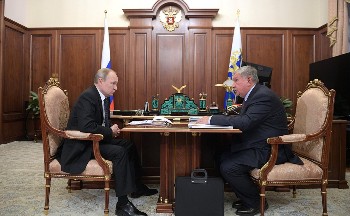Igor Sechin Reports to the President of the Russian Federation on the Company’s 2019 Operating Results and Prospects of Vostok Oil Project
-350x1000.jpg)
 |
| Photo Credit: Press Service of the President of Russia |
Vladimir Putin has held a working meeting with Rosneft Oil Company Chief Executive Officer Igor Sechin. The Company’s 2019 results and its promising projects were the main topics of the meeting.
According to Igor Sechin, despite the deteriorating international situation, the 2019 results of Rosneft’s operation remained positive. For instance, the Company’s hydrocarbon amounted to 285.5 million tonnes of oil equivalent, while the average daily production was 5.8 million barrels per day. That result is one of the best in the global industry.
In his report to Vladimir Putin, Igor Sechin also noted that in 2019, almost 3,000 linear kilometres of 2D seismic surveying was carried out and 11,300 square kilometres of 3D surveying, which was 12.3% more than in the previous year. “According to current estimates, the testing of 144 exploration wells will be completed on land with a success rate of almost 90%,” Sechin said.
As he explained, last year, the volume of oil and gas condensate processing amounted to 110 million tonnes, including over 10 million tonnes at the Company’s international oil refineries, fully covering the demand on the domestic market and fulfilling the Company’s responsibilities.
In 2019, Rosneft continued cooperation with the final consumers by extending long-term contracts to deliver oil via the Druzhba pipeline in the direction of Poland, the Czech Republic, and Germany.
“We have even increased our ownership in Bavaria at the Bayernoil refinery. We have supplied 83 million tonnes of oil to Germany since 2016, which accounts for 25% of their total oil imports,” Rosneft CEO told Vladimir Putin.
In 2019, Rosneft’s retail sale of motor fuels was about 6% higher than in 2018.
When asked by the President of the Russian Federation about the level of production expenses, Igor Sechin said that they were the lowest among public oil companies. “At the end of 2019, production costs amounted to $3.2 per barrel of oil equivalent, which is the most competitive figure in the world,” he said.
In addition, Rosneft CEO noted that the Company is number one among public companies with respect to reserves. Their replenishment was proceeding at a fast pace of about 180% of accumulated production.
The Company’s investment totalled almost one trillion roubles in 2019. As Igor Sechin said, Rosneft retained its leading position in terms of specific capital investment in oil and gas production.
Rosneft Chief Executive Officer reported to the President that the Company ensured the highest level of dividend payout in 2019 (for 2018 and interim 2019), some 283 million roubles.
Vladimir Putin noted that Rosneft was the country’s biggest taxpayer. “We are honoured to maintain this level,” Igor Sechin said. According to him, for 2019 the Company would pay some 3.6 trillion roubles directly into the tax system, the country’s budget.
During the meeting, the President of Russia asked Rosneft CEO to tell about the promising Vostok Oil project.
“As part of the instructions given for the implementation of national projects, we have been assigned the task of ensuring cargo flow along the Northern sea route. To that end, our Company and its partners are currently forming a new oil and gas province in the country’s north, on Taimyr Peninsula, which has great resource potential. The project is called Vostok Oil. At the moment, the resource potential is over five billion tonnes of oil,” Igor Sechin reported.
He told that the total amount of investment for the entire period would be over ten trillion roubles.
“Around two trillion roubles will be allocated at the first stage of the project,” he added. “Is this North from Vankor field?” specified the President. Sechin detailed, “400 kilometres directly north from Vankor. There will be two large fields, the Payakhskoye and the Zapadno-Irkinskoye fields. In all, the project features the creation of 15 towns to house oilfield workers; two airports; a sea port; some 800 kilometres of line pipes; some 7,000 kilometres of infield pipes; 3,500 kilometres of electrical lines; 2,000 MW of electric power; and about 100,000 new jobs. The implementation of the project will boost the country’s annual GDP by 2%.”
Igor Sechin said that, according to calculations by the Institute of National Economy Forecasting of the Russian Academy of Sciences, the services’ and goods’ purchasing synergy would have a coefficient of 9.3 for each rouble invested in the Vostok Oil project. “It would allow us to carry out a major stable project in the global sector that will influence world markets,” the Company’s Chief Executive Officer explained.
“We are currently working with Indian companies; they are showing interest in the project. There are also some other Western investors. We believe Vostok Oil can become a large-scale international project,” Igor Sechin emphasised.
“The project is ambitious and promising,” the President of Russia said at the end of the meeting. “It will facilitate GDP growth, increase shipping along the Northern Sea Route, and, of course, it will strengthen Russia’s position in the Arctic in general.”
Rosneft
Information
Division
February 11, 2020